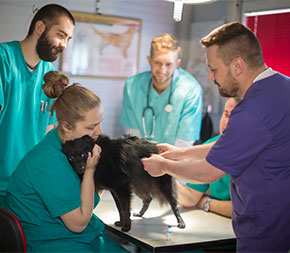
What Degree Levels are Available?
A good vet technician school will prepare you for the Veterinary Technician National Exam (VTNE) and immediate placement in a clinic or laboratory. Additionally, accredited veterinary technician programs are required to include internship/externship opportunities in their curriculum. Be sure to look for these features when you consider program options.
Veterinary technicians are a crucial part of the veterinary practice. In order to help animals that are injured or sick, you’ll need a formal education and veterinary technician certification. The majority of veterinary technicians enter into the field with an associate’s degree, but that isn’t the only option available to you.
Earning a bachelor’s degree in veterinary technology or medicine can help you advance in your career, and move into positions with more responsibility (and more earnings).
Here’s a rundown on what these degree programs entail:
Associate Degree
This is the more common degree path for veterinary technicians and takes less time (16-to-24 months) to complete than a bachelor’s degree. This is a big plus if you want to get the ball rolling on your new career as quickly as possible. Typically, these degrees are offered through community colleges.
Bachelor’s Degree
A bachelor’s degree is less common for veterinary technicians, but the degree level is made all the more valuable because of that. Holding a bachelor’s degrees might make you eligible for higher earning opportunities, but the downside is it takes longer to achieve (four years), delaying the start of your career.
What Will I Learn in My Courses?
Your courses will equip you with all the knowledge you need to be a veterinary technician, from emergency procedures to understanding animal behavior. If you choose to specialize in a specific area of vet tech studies, your courses might look slightly different than other programs. Or you might consider professional certification in order to specialize later on. General courses you might take in a vet technician program include:
There will also be some clinical and lab training required, particularly as you advance in your degree.
Internships and Externships
Hands-on experience is crucial part of a veterinary technician education. Therefore, in order to qualify for accreditation, schools are required to include a period of hands-on clinical experience for all students. This period is called an internship, externship, preceptorship, or practicum. Making the most of your clinical experience will reduce the amount of time you need to spend learning on the job.
The Importance of Vet Tech School Accreditation
Deciding on the ideal vet tech school program to fit your education and career goals can be a challenging step.
One of the most important factors when you are choosing a veterinary technician school is the program’s accreditation. Accreditation means that a school, university, or program has been reviewed and approved by a third-party accrediting organization, stating that the veterinary technician school meets or exceeds the organization’s standards.
The Accrediting Body
The most influential accrediting organization in the veterinary field is the American Veterinary Medicine Association (AVMA). The AVMA Committee on Veterinary Technician Education and Activities is recognized by the U.S. Department of Education and is responsible for the review process that sets the standards vet tech schools must meet before earning the accreditation. The AVMA publishes a list of accredited veterinary technician schools that have passed their review process.
Attending an accredited veterinary technician school has multiple advantages:
Types of Veterinary Technician School Accreditation
Credits earned at a nationally accredited school transfer easily to other nationally accredited programs, but they are not usually accepted at colleges holding a regional accreditation. However, credits from one of the six regionally accrediting agencies, recognized by the Department of Education, are accepted by nationally accredited programs, and are also usually accepted by other regionally accredited programs.
For a veterinary technician education program to qualify for accreditation, the school is required to offer hands-on laboratory or clinical experience as well as classroom study.